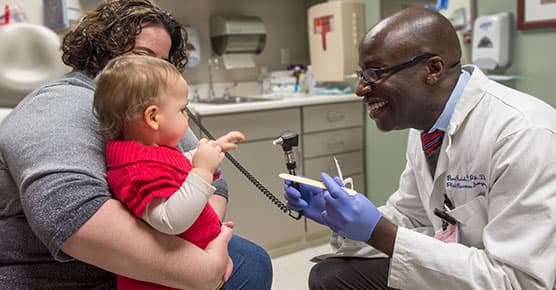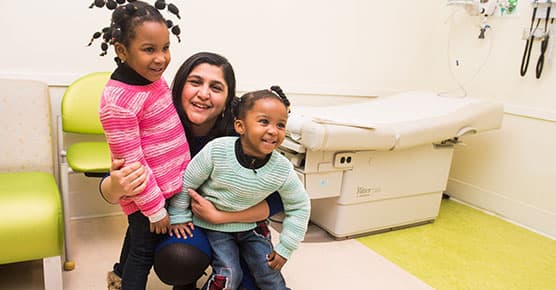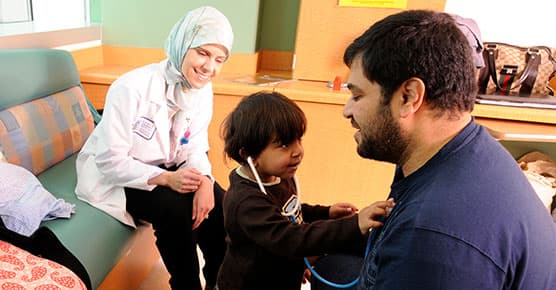Preparing for Your Child's Hospital Stay
We recognize that with the stress of a hospital stay, it is important that you are confident that your child's emotional and health care needs are being fully met. If you have any concerns about your child's care, please ask to speak with a nurse manager or the family advocate, and one of them will address your concerns.
Flu Season Alert
For the safety of our patients, children under the age of 12 are not allowed to visit patients during flu season.
Preparing for Your Child's Stay
We want you and your child to have a safe, comfortable experience at the University of Chicago Medicine Comer Children's Hospital. If you have any concerns about your child's surgery or procedure, please speak with your child's physician, nurse or other member of his or her health care team.
Bringing What You Need for Your Child
Please review the list below carefully. The first three items are "musts" for everyone:
- Your child's social security number
- Insurance card and policy number
- Cash, check, or major credit card — such as Visa, MasterCard or American Express — to pay for services not covered by insurance. Please call 773-702-6234 if you have any questions.
- The name, address, and phone number of the insured's employer if your child is covered by insurance provided by that employer
- Managed Care Referral Authorization if your child is covered by an HMO or PPO plan and the plan requires a referral
- Name, address and phone number of the primary and referring physician if your child was referred to UChicago Medicine
- Medications your child takes on a regular basis
Assistive Devices
Please tell your child's nurse if your child has an orthopaedic device, contact lenses, eyeglasses, a hearing aid or any other assistive device so the devices can be stored appropriately when your child is not using them.
Personal Belongings
The items you wish to bring are, of course, a matter of personal preference. Below is a list of the items most families find their children need/want while hospitalized:
- Personal toiletries, such as shampoo, toothpaste and toothbrush
- Bathrobe, slippers or socks
- A favorite toy or other item from home (inexpensive and labeled with your child's name)
- Books, magazines or schoolwork for older children
What Not to Bring
The hospital cannot be responsible for personal items, so please do not bring:
- Expensive toys
- Jewelry or other valuables
- Hair dryer or other electrical appliances
- An irreplaceable favorite item
For your convenience, there is a safe in your child's room. If your child is in the Neonatal Intensive Care Unit or the Pediatric Intensive Care Unit, ask a member of your care team to put items of value in the hospital safe for you.
- Vital signs/physical assessments are usually done every four hours. These include heart rate, respiratory rate, temperature, and blood pressure. We will also frequently assess your child’s comfort and do all we can to manage pain. (Please refer to the pain chart in your child's room.)
- Your child's weight may be measured each day, as directed by his/her physician. We may monitor how much your child eats and drinks and/or how often they urinate or have a bowel movement. You can help by letting us know.
- Your child needs to stay as active as possible, especially after surgery. Your doctor will direct your child’s activity level.
- Certain illnesses may require your child to be in isolation. Depending on the type of isolation, all staff entering the room will wear gowns, gloves and/or a mask. You and your child will need to stay in the hospital room. Your nurse will explain what is required.
If you have any questions or concerns, please speak with your child’s nurse or physician.
Children and teenagers may have a variety of responses to hospitalization. The following suggestions may help you prepare your child for his or her hospital experience:
- Talk honestly about what will happen and listen to your child’s or teen’s concerns.
- Reassure your child or teenager that the hospitalization is not his or her fault. Some children think that hospitalization is the result of something they have done wrong.
- Use educational materials, such as dolls, pictures and books to provide your child the opportunity to play or talk out his or her experience. Read books with younger children about hospitals. Some books that may be helpful for children ages 4 to 7 are:
- Going to the Hospital by Fred Rogers and Jim Judkis
- A Visit to the Sesame Street Hospital by Deborah Hautzig, Dan Elliot and Joe Mathieu
- Tubes in My Ears: My Trip to the Hospital by Virginia Dooley and Miriam Katin
- Remember to let brothers and sisters know what’s going on so they don’t feel left out or worried.
If you are unsure when and how to explain hospitalization to your child or teenager, you can talk to a child life specialist on the day of admission or reach a child life specialist in advance at 773-702-6481. Child life specialists can also provide activities and relaxation techniques to help hospitalized children.
Your child's nurses, case managers and physicians will be working together with you as soon as your child arrives in hopes of getting your entire family together again at home. When your child's physician writes the discharge orders, this begins the process to go home.
You will need to make arrangements for your departure. It's the law that young children are in a car seat or booster seat when traveling by car. As early as possible, let your nurse know if you are having difficulty obtaining a car seat for travel home.
Your nurse and other members of your health care team will help your family learn how to take care of your child at home.
We Need Your Feedback
If you receive a customer satisfaction survey in the mail, please take a few moments to fill it out and return it. Your opinion counts!
Patient & Visitor Resources

Patient Information
Learn more about our comprehensive patient resources

Directions & Maps
Find directions and maps to Comer Children's

Visitor Information
Read about the visitor resources we offer



